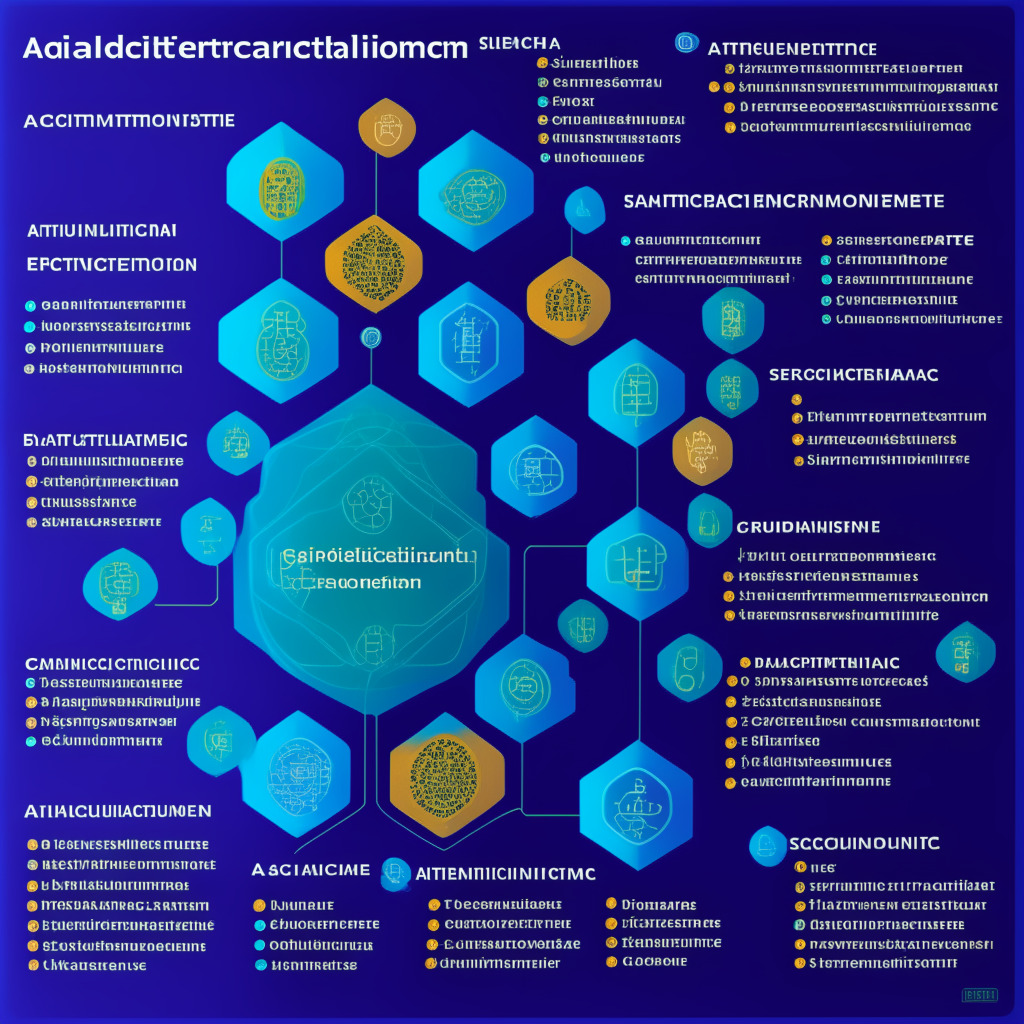Apple recently restricted the use of ChatGPT and other AI tools, fearing potential exposure of sensitive data. Other major companies like Samsung, JPMorgan, and Goldman Sachs have also prohibited internal use of generative AI, while simultaneously developing their own applications.
Search Results for: RSI
Bitcoin Market Uncertainty: Symmetrical Triangle, MicroStrategy’s Ordinals, and Coin Cafe Fallout
Bitcoin faces uncertainty amidst a symmetrical triangle and price action within $26.5K-$27.5K range. Factors impacting its direction include the recent Bitcoin 2023 Conference, potential adoption of Bitcoin Ordinals by MicroStrategy, and punitive actions against Coin Cafe.
Square Enix Dives Deeper into Blockchain & NFT Gaming: Bold Move or Costly Mistake?
Japanese gaming giant Square Enix plans to further develop blockchain, Web3, and NFT games despite declining revenue and backlash from gaming communities. The company remains optimistic about their blockchain initiatives, prioritizing blockchain game development and targeting Web3 growth to become a pioneer in the field.
Bitboy, Beeple & the Bizarre BEN Token Saga: Lessons in Crypto Caution and Debate
Crypto influencer Bitboy paid $430,000 for a 20% stake in the Ethereum-based BEN token, sparking criticism and skepticism. Bitboy’s controversial actions and digital artist Beeple’s mocking response highlight the unpredictable nature of the crypto market and the need for caution, due diligence, and skepticism in unproven investments.
Hong Kong’s CBDC Pilot Project: Progress, Controversy, and the Future of Blockchain
The HKMA recently launched a pilot project called Cyber Hong Kong Dollar, a CBDC involving 16 companies, including Alipay Financial, Mastercard Asia, Ripple Labs, Visa, and HSBC. The e-HKD aims to test six potential use cases while results are expected at Hong Kong Fintech Week 2023.
Ledger’s Deleted Tweet Controversy: Balancing Trust and Security in Crypto Wallets
Ledger CTO Charles Guillemet clarified that the wallet’s OS requires user consent before accessing private keys, dispelling concerns after a controversial tweet about firmware capable of extracting users’ private keys. The controversy highlights the delicate trust balance and the importance of transparency between wallet providers and users.
Crypto Market Volatility: Debt Ceiling Debates and the 2024 Bitcoin Halving Cycle
The crypto market faces downturn amidst concerns such as lack of regulatory clarity, ongoing debt ceiling talks, and cryptocurrency value. As volatility persists, investors should stay informed, anticipate future trends like the 2024 bitcoin halving, and approach the market with cautious optimism.
MicroBT Unveils High-Power Mining Rigs: Balancing Efficiency & Sustainability in Crypto Mining
MicroBT recently introduced three high-performance Bitcoin mining rigs at the Bitcoin2023 conference, with a focus on utilizing sustainable energy sources. The company is tweaking the voltage and frequency of their WhatsMiner machines to be compatible with solar power, and working on repurposing waste heat for various applications, showcasing the potential for mining technology to evolve in terms of efficiency and sustainability.
Texas Crypto Exchanges Face New Reserve Rules: Consumer Protection vs. Business Impact
Texas recently approved House Bill 1666, enforcing “proof of reserves” rules for crypto exchanges to maintain sufficient assets for customer obligations. It also enforces new regulations on managing customer funds, increasing transparency and setting higher standards for platforms operating in Texas. However, pending Senate Bill 1751 could introduce restrictions on Bitcoin mining.
Coinbase One: Subscription Model Revolution or Overpriced Crypto Service?
Coinbase is launching “Coinbase One,” a subscription service offering zero-fee trading, boosted staking rewards, and exclusive benefits in 35 countries. This shift towards a subscription-based model could transform the crypto landscape, while skeptics question its worth compared to the traditional fee-per-transaction structure.
Lagrange Labs’ $4M Funding: Interoperability in DeFi and the Security Challenges Ahead
Zero-knowledge startup Lagrange Labs raised $4 million in pre-seed funding for secure blockchain interoperability development, enabling decentralized apps (dApps) to function across multiple networks. However, supporting multi-chain dApps could expose unaccounted risks and vulnerabilities, necessitating careful assessment.
US Congress Urged to Form Digital Asset Commission: Balancing Innovation and Regulation
The Chamber of Digital Commerce urges the US Congress to establish legislation concerning digital assets and create a “Digital Asset and Blockchain Technology Solarium Commission.” This Commission would facilitate cooperation between government, industry, and academia, providing direction for the future of US blockchain and digital asset research and development.
Bitcoin 2023: Navigating Regulation & Cryptocurrency’s Response to Anti-Crypto Forces
At the Bitcoin 2023 event, a panel discussed the “dire” regulatory environment and its impact on the cryptocurrency industry. Panellists emphasized the importance of collaboration, education, and cooperation with regulators to address challenges and uphold American values, while acknowledging divergent opinions on the industry’s response to regulation.
Meme Coin Frenzy: Analyzing Andrew Tate’s Shitcoin Endorsement & Market Impact
The cryptocurrency market has been taken over by “meme coins,” causing congestion on major blockchains like Bitcoin and Ethereum. Controversial influencer Andrew Tate announced plans to endorse a “shitcoin,” fueling speculation and potentially pumping the value of coins like Copium Token, Milady, AiDoge, Pepe, and SpongeBob.
Stablecoin Regulation Debate: Balancing State vs. Federal Control for Innovation & Security
The House Committee on Financial Services’ new Subcommittee on Digital Assets, Financial Technology, and Inclusion debated two proposed bills for stablecoin regulation, highlighting the need for a balance between state and federal control. The ongoing discussion emphasizes finding a suitable middle ground that fosters innovation and guarantees stakeholders’ best interests.
Coin Cafe’s Hidden Fees Debacle: Balancing Crypto Regulation and Industry Growth
New York Attorney General Letitia James secured $4.3 million from Coin Cafe, a Brooklyn-based digital currency service provider, for charging undisclosed, exorbitant fees for its “free” wallet storage services. This case highlights the importance of effective regulation in ensuring investor safety and combating deceptive marketing practices in the growing cryptocurrency industry.
Stablecoin Regulation Debate: US Lawmakers’ Divide and the Future of Digital Dollar
The US House Financial Services Committee’s digital assets panel debated on stablecoin regulations, highlighting divides between Republican and Democratic ideas. Both parties do align in addressing risks to consumers and maintaining the US dollar’s role in global commerce. Lawmakers are paying heightened attention to stablecoin regulations and wider crypto topics, marking progress in US oversight of the industry.
US
A joint hearing on digital asset regulation between the House Financial Services Committee and Agriculture Committee revealed conflicts between lawmakers on handling cryptocurrencies. Witnesses advocated for legal amendments addressing blockchain technology, while some lawmakers deemed existing regulations sufficient. The stalemate complicates predicting major legislative changes or digital asset firms enjoying freedom from regulation.
Chinese State-owned Firm Enters Hong Kong’s Digital Asset Hub: Pros, Cons, and Main Conflicts
Chinese state-owned real estate company Greenland Holdings plans to join Hong Kong’s digital asset hub by creating a new unit to acquire virtual asset trading licenses. This move supports Hong Kong’s efforts to become a prominent digital assets trading center and diversifies Greenland Holdings’ business in the growing market.
Balancing AI Advancements with Blockchain for Ethical Future
Blockchain technology offers transparency, traceability, and trust, which could offset some opaqueness associated with AI. Integrating blockchain may enhance transparency in AI models and ensure responsible AI governance standards, providing accountability and promoting ethical practices amid growing concerns about AI’s societal impact.
Ripple CBDC Platform: Revolutionizing Central Bank Digital Currencies or Risking Control?
Ripple is launching a unique platform for central bank digital currencies (CBDCs), empowering governments and financial institutions to design and develop digital currencies with ease. Leveraging Ripple’s Private Ledger, the platform enables instant settlement for domestic and cross-border payments, improving user experience in transactions.
Dogecoin’s Price Surge: Understanding the Golden Cross, NFTs, and Future Predictions
Dogecoin (DOGE) price has risen by 2% in the past 24 hours amid increased demand and all-time high transactions on its blockchain, largely driven by new DRC-20 tokens. The ‘golden cross’ indicator suggests a possible breakout for DOGE, while its potential as a more useful vehicle for NFT minting than Bitcoin could further bolster its price.
Crypto Surge Amid US Debt-Ceiling Optimism and CBDC Developments: Analyzing the Impact
Bitcoin experiences a 3% increase amid optimism surrounding a potential US debt-ceiling deal and rallying equity markets. Ripple develops a CBDC platform enabling institutions to issue digital currencies. Meanwhile, the Bitcoin Frogs NFT collection gains traction as the most traded within 24 hours.
Ledger’s Recovery Service: Balancing Convenience and Security in Crypto Wallet Backups
Ledger introduces a new wallet recovery service, but faces mixed reactions from the crypto community due to concerns over privacy and security. The optional recovery service backs up users’ seed recovery phrases by encrypting and splitting them among third parties, aiming to prevent irreversible asset loss. However, some users fear it increases vulnerability.
Rise and Fall of PUNK ETF: Metaverse Potential vs Ethical Concerns
The Subversive Metaverse ETF (PUNK), launched to oppose Meta’s metaverse strategy, is shutting down after a 30% loss over 15 months. As skepticism about the metaverse grows, the importance of balancing innovation with ethical practices and scrutinizing key industry players’ motives is highlighted.
ApeCoin’s Accelerator: DAO Approved Launchpad for a Thriving Ecosystem or Just Hype?
The ApeCoin DAO community approved AIP-209, launching an Accelerator to support the incubation of projects using ApeCoin tokens. Aiming to strengthen the ApeCoin ecosystem, Ape Accelerator involves the community as initiators, voters, and participants, focusing on projects to improve the value of the Bored Ape Yacht Club NFT collection and other ApeCoin-utilizing initiatives.
Synergy Between Bitcoin and PoS Blockchains: Exploring Security and Energy Implications
Stanford professor David Tsè reveals research on synergy between Bitcoin and proof-of-stake blockchains, addressing PoS limitations and energy consumption implications. By protocol-sharing security, overall strength can be boosted. Bitcoin’s “long-range” security complements PoS, attracting developers for distributed ledger applications and NFTs, offering potential for a symbiotic blockchain future.
Blockchain Revolution: Boon or Bane? Weighing Opportunities and Challenges in Emerging Tech
Blockchain technology has the potential to revolutionize various sectors, offering transparency, security, and decentralized solutions. However, challenges such as high energy consumption, lack of regulatory frameworks, and scalability issues persist. Recognizing both the potential and weaknesses of blockchain is essential for its future success.
Ripple’s Role in e-HKD CBDC Pilot: Balancing Innovation and Regulation
Ripple is participating in the Hong Kong Monetary Authority’s (HKMA) digital Hong Kong dollar (e-HKD) central bank digital currency (CBDC) pilot program, showcasing a real estate asset tokenization solution and revealing a new CBDC platform. In collaboration with Taiwan’s Fubon Bank, Ripple aims to streamline equity release processes and encourage wider use of digital currencies.
Ripple’s CBDC Platform: Pioneering Digital Currency for Central Banks & Challenging Traditional Finance
Ripple is developing a platform for central banks, governments, and financial institutions to issue their own central bank digital currency (CBDC), offering benefits like minting, distribution, and accessibility in areas with limited internet connectivity. The platform will be tested within the e-HKD pilot program, highlighting its real-world potential and versatility.
Recovering Misappropriated FTX Funds: Accountability vs Industry Reputation Debate
Alameda Research and West Realm Shires attempt to recover $6.9 million from Embed Financial shareholders after allegations of FTX’s Sam Bankman-Fried acquiring Embed using misappropriated funds. The case highlights the importance of transparency, accountability, and ethical practices in the blockchain and cryptocurrency markets.
Bitcoin Struggles at $27,500: Tether’s Impact, Korea’s Regulations, and Pakistan’s Ban
Bitcoin struggles to overcome the $27,500 resistance level amid a downward trendline, while Tether plans to purchase Bitcoin to diversify its reserve holdings backing USDT. Meanwhile, Korean politicians unite for crypto regulations, and Pakistan enforces a ban on cryptocurrency services due to FATF requirements.































